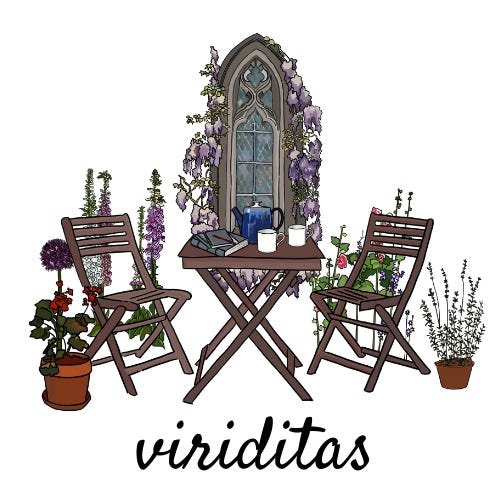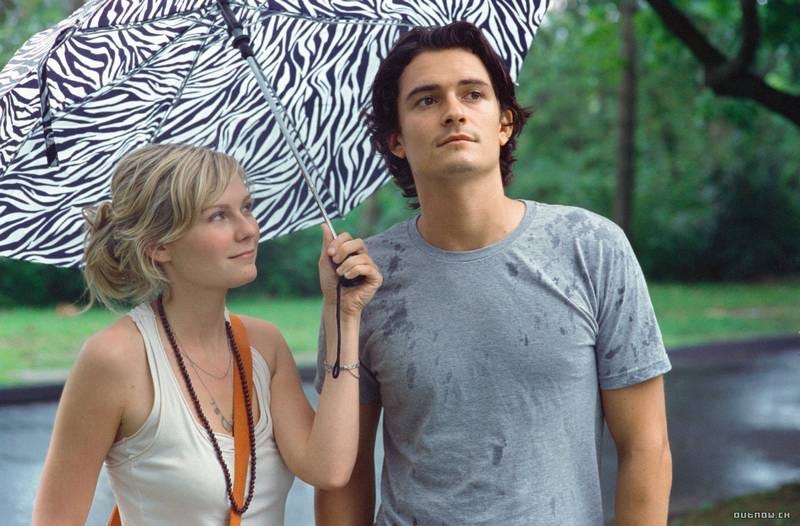Grow Along Week 6
Reflections for holy week curtesy of Orlando Bloom and Kirsten Dunst
Greetings friends,
I’d like to invite you into a practice of presence. Ready?
It’s Tuesday of holy week, and I’m sitting on the floor of my living room next to our large sliding glass doors with a view of our patio and the raised beds which are prepped and ready for new residents of flowers, vegetables, and herbs. These doors are south-facing which means it heats up inside rather quickly on a warm day. We’ve yet to turn on our air conditioning this year so the doors are open and I feel a robust wind coming through the screen.
In the distance I hear an array of sounds. There are wind chimes, the birdsong of a house finch, a leaf blower, a child’s high pitched voice, and the breeze as it cuts through the bare branches on the trees. From the speaker on my bookshelf, I hear Music for Holy Week by the Choir of King’s College in Cambridge. I can’t really make out the words they’re singing, but the sound of the choir feels like home.
I’m drinking a cup of yorkshire gold tea in my union jack mug that I thrifted in the UK. I have Joy Clarkson to thank for introducing me to this particular tea. I love it with milk, but just a splash.
I can’t say that I smell much of anything. I’m thinking now that I want to light a candle. Maybe the one given to us by a student, homemade with bits of dried lavender in view at the top. I think it’s lavender and… cedar? That can’t be right. In any case I’m afraid that wind I told you about might blow it out.
My fingertips feel the sturdy keys beneath them as I type. A moment ago I had the pleasure of cuddling my fluffy cat whose purrs are so strong that I felt the vibration on my arm. My hair is blowing into my face a bit and it tickles my cheek.
I wonder where you are reading this today? I wonder what you can see, hear, taste, smell, and touch? Give yourself permission to pause and take note. You have all the time you need. This is an email after all, and you can come back to it anytime. Grounding yourself in your body might be enough work for today.
As ever, you’ll find in this edition a reflective essay, some resource ideas, and a blessing. Remember, this is our place and we make the rules. Scroll to what you need today. Read the whole thing at once or break it up into smaller bits. Ignore some of it all-together. Do what is right for you.
Thank you ever so much for being a subscriber. The gift of your email address is not lost on me. I know you don’t give that out willy nilly. If, however, your inbox is feeling crowded, you might enjoy the Substack App, where you can read and engage with all your newsletters in one place.

One of my favorite film scenes is in the 2005 “romantic tragicomedy” Elizabethtown, starring Orlando Bloom and Kirsten Dunst. My childhood best friend and I watched this nearly every time we stayed at each other’s house, and we still quote it to each other more than a decade later.
In the film, Orlando Bloom’s character Drew Baylor is in the middle of a suicide attempt, after losing his job and his girlfriend, when his phone rings incessantly. He answers it to learn that his father has died and he needs to travel home for the funeral. Drew puts his suicide plans on hold and makes the trip from New York to Kentucky. On the night before the funeral, he’s staying in a local hotel and can overhear the raucous wedding party staying on the same floor. Thinking he wouldn’t be noticed, Drew walks out of his hotel room and into that of the wedding party to steal a few beers. He puts them in his hotel-issued robe pockets and is making his way back down the hall when he’s stopped by a member of the party. This man is clearly drunk but notices Drew’s full pockets. The man gives Drew a skeptical look and asks, “Bride or groom?” Drew says, “……Groom?” And the man says, “I’m the groom!”
Feeling caught, Drew then explains that his father has just died and that he’s here for the funeral, hoping to garner sympathy instead of reprove. The groom starts to cry, pulls Drew into a strong embrace and says, “Death and life! Life and death! RIGHT NEXT DOOR TO EACH OTHER?!” As they hug, we can hear the beer bottles in Drew’s pockets clink together with the beer bottles in the groom’s pockets.
I think of this scene often in my work as a hospital chaplain. Many days I am called to name and bless a new baby only hours or minutes before I’m called to say end of life prayers with someone on another ward. Death and life. Life and death. Right next door to each other. And this holy week I’m freshly aware of the juxtaposition.
As it turns out, life and death are not opposites. They can’t be separated. Not really. Death and life are bound up together. Whether it is literal life and death like the events described in a hospital, or feelings of deep pain and joy in other spheres of our lives, death and life are two sides of the same coin.
In the instant of Jesus’s death, the curtain the temple was torn and the people of God had access to the most sacred part of the temple. The ice began to thaw. Bits of life and light began to break in. Jesus said, “It is finished,” which was more than a statement about his breath no longer filling his lungs. It was an indication that death was finished, and life is available to all. And yet the work of redemption was not yet complete.

That leads me to think about holy Saturday, the day between death and life. Many times we rush right past holy Saturday without acknowledging it much. It is simply the middle day of the story. But between you and me? It might be my favorite day of the Paschal Triduum (the time between Maundy Thursday and Easter Sunday).
I love holy Saturday because it’s an analogy for our lives, really. We are all, at any given time, living in this in-between space of death and hope. We have known the pain of loss, disappointment, grief, betrayal, and unmet expectations. The worst has happened, and now we are here to wait. Easter is not here yet. Some may not even know or believe that ‘Easter’ is coming. We remain, waiting, perhaps with feelings of hopelessness.
Shelly Rambo, theologian and theology professor, has an incredible book about Holy Saturday called Spirit and Trauma: A Theology of Remaining. She writes,
“Looking through the lens of trauma, it is important to revisit the Spirit not as a figure who secures love between death and life but rather as one who witnesses to what remains—what persists—between them. This is the ever-greater Spirit of the middle, the fruit of love forged through death. This middle Spirit rewrites an understanding of love in significant ways, attesting to a form of divine presence that is difficult to see, to feel, and to touch. The Spirit provides a distinctive way of orienting oneself between death and life, a way of witnessing to the fractured dimensions of word and body between death and life.”
In essence, for those of us who testify to our place in the Christian story, the Spirit models for us what it looks like to remain between life and death, along our way from dust to dust. And the Spirit remains with us in our own in-between-ness.
We bear witness to what persists in this middle space.
We tell of the ‘fruit of love forged through death’ and of a Divine presence beyond understanding.
We are honest about where we’ve been, we look to the ‘middle Spirit’, and somehow strive for hope that, in the words of Julian of Norwich, all shall be well.
It’s not Easter yet, so you won’t get any bright celebrations from me today. But perhaps, like Drew and the groom, we can meet here and clink bottles together in a acceptance of our proximity to life and death. Perhaps we can hold space for one another with an awareness of “a love that survives and remains not in victory but in weariness.”1
Whatever your particular weariness may be, I pray you know the nearness of the Spirit which bears witness and remains with you. Love is born of death. Love endures. Love remains.
Resources and ideas for Further Reflection
Questions for your own reflection, whether on your own or in the comments:
Where do you currently experience the juxtaposition of life and death?
Take some time to think — where do you see the Spirit? What remains at this crossroad?
In celebration, awe, and gratitude for an embodied God, take time to live in and feel your own body with celebration, awe, and gratitude. You are made in the image of God. You are good. What do you see, hear, touch, taste, and smell? What do you feel? What has your body endured for you?
In light of our weariness, and how we all have it, and the war in Ukraine, and Russians who oppose the war, and others around the world enduring suffering of all kinds — I share this lovely podcast episode from the aforementioned Joy Clarkson on the power of literature to help us cultivate empathy for our neighbors. Joy says, “And when it comes to love, I think imagination is necessary. To empathize with another human being is to enter into their world, imagine what it is like to live in their skin, their story. Literature helps us practice this disposition.”
I so appreciate the liturgical playlists by Sacred Ordinary Days. They are always my go-to during Advent, Lent, Easter, Christmas, etc. The holy week playlist has been a meditation for me this week.
ICYMI: Click here to see my tutorial for making your own resurrection garden for holy week!
A creative way to support Ukrainians I heard about this week: purchase digital content on Etsy from Ukrainian sellers. The two pieces of art in this newsletter are some of the ones I found and love. Perhaps there is something you would like as well? Click here to support sellers in Ukraine.
A blessing for holy week
In your experiences of loss and grief waiting and remaining celebrating and hoping May you know the nearness of God the steadfast love of Christ and the Spirit who bears witness to what persists And may you, in turn, give this gift to others remaining, loving, and testifying to the promise that all shall be well.
I’d love to hear any of your own thoughts, questions, and feelings. Join me in the comments?
With love and persistent gratitude,
Janette
PS I did eventually get up to light the candle. If not now… when? It’s white sage and lavender.
All Rambo quotes from chapter two, Witnessing Holy Saturday, page 79.





I am an avid reader of all things Viriditas, but this newsletter was especially touching and encouraging. I was raised Southern Baptist, but I have recently realized that I align with Anglicanism more than anything else now that I am an adult. I am loving the journey of learning the traditions and liturgy practiced throughout church history. Holy Week itself is a newer concept to me, and this newsletter was very timely and life giving. Thank you!
❤️
So much richness here.
Also, how have I never seen that movie? Must remedy that immediately.